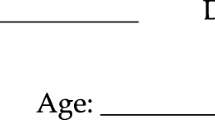Abstract
Development of valid instruments for measuring underlying irrational beliefs is necessary for ongoing research of Rational-Emotive Therapy (RET). This study was designed to further evaluate the validity of one such measure, the Survey of Personal Beliefs (SPB). Adult psychiatric inpatients completed the SPB and measures of depression, hopelessness, and anxiety, as well as a conceptually similar measure of irrational thinking, the Belief Scale. It was predicted that if construct validity exists for the SPB then a significant correlation would exist between irrational beliefs as measured by the SPB and depression, hopelessness, and anxiety. It was also predicted that if the scale has construct validity, then patients being treated with RET would demonstrate a greater reduction in irrational thinking based on SPB scores than would inpatients receiving treatment not based on RET. To evaluate for discriminate validity, it was predicted that the SPB would correlate more highly with a conceptually similar measure of irrational thinking than with measures of depression, hopelessness, and anxiety. The findings of this study offer support for the validity of the SPB. Additional and unexpected findings as well as recommendations are discussed.
Similar content being viewed by others
References
Beck, A. T., & Steer, R. A. (1987).Beck depression inventory manual. New York: The Psychological Corporation.
Beck, A. T., & Steer, R. A. (1988).Beck hopelessness scale manual. New York: The Psychological Corporation.
Beck, A. T., & Steer, R. A. (1990).Beck Anxiety Inventory Manual. Orlando, FL: The Psychological Corporation.
Demaria, T. P., Kassinove, H., & Dill, C. A. (1989). Psychometric properties of the survey of personal beliefs: A rational-emotive measure of irrational thinking.Journal of Personality Assessment, 53 (2), 329–341.
Diener, E., Emmons, R. A., Larsen, R. J., & Griffin, S. (1985). The satisfaction with life scale.Journal of Personality Assessment, 49, 71–75.
DiGiuseppe, R. (1988).Attitudes and belief scale-II. Unpublished test. Unpublished test New York: Institute for Rational-Emotive Therapy.
DiGiuseppe, R., & McInerney, J. (1990). Patterns of addiction: A rationalemotive perspective.Journal of Cognitive Psychotherapy: An International Quarterly, 4(2), 121–134.
Dryden, W., & DiGiuseppe, R. (1990).A primer on rational-emotive therapy. Champaign, IL: Research Press.
Hollon, S. D., & Kendall, P. C. (1980). Cognitive self-statements in depression: Development of an Automatic Thoughts Questionnaire.Cognitive Therapy and Research, 4, 383–395.
Jones, R. (1968).A factored measure of Ellis' irrational belief system with personality and maladjustment correlates. Unpublished doctoral dissertation, Texas Technical College, Lubbock, TX.
Kassinove, H., & Berger, A. (1988).Personal communication.
Kassinove, H., Crisci, R., & Tiegerman, S. (1977). Developmental trends in rational thinking: Implications for rational-emotive school mental health programs.Journal of Community Psychology, 5, 266–274.
Malouff, J., & Schutte, N. (1986). Development and validation of a measure of irrational belief.Journal of Consulting and Clinical Psychology, 54, 860–862.
Malouff, J. M., Valdenegro, J., & Schutte, N. S. (1987). Further validation of a measure of irrational belief.Journal of Rational-Emotive Therapy, 5(3), 189–193.
Muran, J. C., Kassinove, H., Ross, S., & Muran, E. (1989). Irrational thinking and negative emotionality in college students and applicants for mental health services.Journal of Clinical Psychology, 45(2), 188–193.
Nottingham, E. J., & Neimeyer, R. A. (1992). Evaluation of a comprehensive inpatient rational-emotive therapy program: Some preliminary data.Journal of Rational-Emotive Therapy and Cognitive-Behavior Therapy, 10(2), 57–81.
Pavot, W., Deiner, E., Colvin, C. R., & Sandvik, E. (1991). Further validation of the Satisfaction with Life Scale: Evidence for the cross-method convergence of a well-being measure.Journal of Personality Assessment, 57(1), 149–161.
Robb, H. B., III, & Warren, R. (1990). Irrational belief tests: New insights, new directions.Journal of Cognitive Psychotherapy: An International Quarterly, 4(3), 303–311.
Shorkey, C., & Whiteman, V. (1977). Development of the rational behavior inventory: Initial validity and reliability.Educational and Psychological Measurement, 37, 527–534.
Smith, T., & Zurawski, R. (1983). The assessment of irrational beliefs: The question of discriminant validity.Journal of Clinical Psychology, 39, 976–979.
Smith, T. W. (1989). Assessment in rational-emotive therapy: Empirical access to the ABCD model. In M. E. Bernard & R. DiGiuseppe (Eds.),Inside rational-emotive therapy: A critical appraisal of the theory and therapy of Albert Ellis (pp. 135–153). New York: Academic Press.
Smith, T. W., & Allred, K. D. (1986). Rationality revisited: A reassessment of the empirical support for the rational-emotive model. In P. C. Kendall (Ed.),Advances in Cognitive-Behavioral Research and Therapy (Vol 5, pp. 63–87). New York: Academic Press.
Weissman, A. N. (1979).The dysfunctional attitude scale: A validation study. Unpublished doctoral dissertation, University of Pennsylvania, Philadelphia, PA.
Zachary, R. A. (1986).Shipley Institute of Living Scale: Revised Manual. Los Angeles: Western Psychological Services.
Author information
Authors and Affiliations
Additional information
Dr. Nottingham is an Associate Fellow and Approved Supervisor of the Institute for Rational-Emotive Therapy. He is in independent practice with Germantown Psychological Associates, P.C. and is Director of Psychology and Clinical Director of Adult Mental Health Services at Parkwood Hospital, Olive Branch, MS.
I would like to thank Ivey Bright, Brad Barris, and Dee Conrad for their assistance in data collection. Additionally, without the assistance and support of the Parkwood Hospital administration and staff, this research could not have been completed.
Rights and permissions
About this article
Cite this article
Nottingham, E.J. Use of the Survey of Personal Beliefs Scale: Further validation of a measure of irrational beliefs with psychiatric inpatients. J Rational-Emot Cognitive-Behav Ther 10, 207–217 (1992). https://doi.org/10.1007/BF01062375
Issue Date:
DOI: https://doi.org/10.1007/BF01062375



